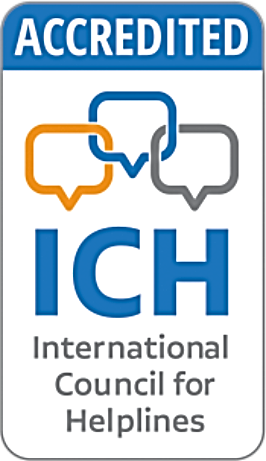
Suicidal thoughts and behaviors are on the rise among teens, according to the Centers for Disease Control and Prevention’s (CDC) latest Youth Risk Behavior Survey. The survey found 57% of teen girls and 29% of teen boys felt persistently sad or hopeless in 2021. Almost one in three teen girls seriously considered ending their lives. The CDC said rates of suicidal thoughts and behaviors increased dramatically over the past decade.
Suicide is the second leading cause of death among people aged 10-14 and the third leading cause of death among those aged 15-24 in the U.S., according to the National Alliance on Mental Illness.
These alarming trends are being seen by hotline counselors at CONTACT of Mercer County, NJ, who are responding to texts and chats from younger and younger teens. When the hotline began answering chats and texts in 2014, counselors heard from a number of teens as young as 15 or 16. “Now we’re hearing from many 12- and 13-year-olds,” said CONTACT Assistant Executive Director Tony Ciavolella. Common concerns hotline counselors hear from teens include family, relationships, bullying and LGBTQ issues.
The COVID-19 pandemic contributed to the mental health challenges teens are facing, says CONTACT Executive Director Eleanor Letcher. “We were seeing an increase in mental health concerns among teens before the pandemic, but the rise happened a lot faster during COVID,” she said.
What Happens When You Connect With CONTACT?
CONTACT’s 20 regular part-time counselors answers texts, chats from New Jersey residents as well as people from around the country who text 988 or chat online via 988lifeline.org/chat/. The hotline receives an average of 1,200 texts and chats each month. “The majority of people are having thoughts of suicide, but sometimes people contact us because they just want a person to talk to,” Ciavolella said. The majority of people who use CONTACT’s chat or text are teens or young adults under age 25.
“Young people often like the anonymity that comes with chatting or texting,” Letcher said. “It feels more confidential to them.”
People can also call CONTACT 9 am-9 pm seven days a week at (609) 896-2120 or call 988 any time to be connected to the national crisis hotline. The chat, text and phone hotline services are anonymous, confidential, and free.
When a person contacts the hotline, they are asked for basic information including name, age, gender and phone number. The person can choose which information to provide. The CONTACT counselor they communicate with has received training in active listening – a technique in which the counselor truly hears what the person says without interrupting them or minimizing what they’re saying. “The counselor listens to the person’s feelings and emotions about whatever the situation is, without telling them what they need to do,” Ciavolella said. “The counselor is not there to give advice. It’s more like an ER doctor providing triage, getting the person through the night, getting them to a place of safety. We can give recommendations or referrals for mental health care, but they have to follow up with their own health care provider.”
The average conversation can range from 30 minutes to almost two hours, although many last for 45 minutes to an hour. When a counselor starts chatting or texting with someone, they ask how the person is and what’s troubling them. The counselor does an assessment. Is the person suicidal? If so, why? Have they attempted suicide before?
Early in the conversation, the counselor asks if the person has taken pills or taken another potentially dangerous action already. “The counselor determines if this is an emergency, and if so, how far along it is,” Letcher said. “If it is an emergency, the counselor will get a hotline staff person involved to get them immediate help.”
If the person is not in immediate danger, the counselor works with them to develop a safety plan. The counselor will ask what makes the person feel better, such as listening to music, or streaming movies. The conversation will continue until the person moves beyond immediate thoughts of suicide. “We want to get them beyond that imminent thought that they just don’t want to go on,” Letcher said. Once the person is not at imminent risk of self-harm or suicidal thoughts, the counselor offers a follow-up phone call. “Research has shown that offering follow-ups can save some people because they feel someone cares about them,” she said. “If they feel someone cares it can really impact their will to live.”
CONTACT of Mercer County also offers:
- A support group for people who have lost a loved one to suicide. The group meets the third Wednesday of every month at 7:30 at Pennington United Methodist Church, 60 South Main St. in Pennington. There is no charge.
- A free mental health and suicide prevention training course, which trains people in active listening techniques. It runs over several months on Wednesday and Thursday evenings. “The more people know about active listening and suicide prevention, the better resource they can be for friends and family,” Letcher said.
Find out more about these services at Contactofmercer.org.

Suicidal thoughts and behaviors are on the rise among teens, according to the Centers for Disease Control and Prevention’s (CDC) latest Youth Risk Behavior Survey. The survey found 57% of teen girls and 29% of teen boys felt persistently sad or hopeless in 2021. Almost one in three teen girls seriously considered ending their lives. The CDC said rates of suicidal thoughts and behaviors increased dramatically over the past decade.
Suicide is the second leading cause of death among people aged 10-14 and the third leading cause of death among those aged 15-24 in the U.S., according to the National Alliance on Mental Illness.
These alarming trends are being seen by hotline counselors at CONTACT of Mercer County, NJ, who are responding to texts and chats from younger and younger teens. When the hotline began answering chats and texts in 2014, counselors heard from a number of teens as young as 15 or 16. “Now we’re hearing from many 12- and 13-year-olds,” said CONTACT Assistant Executive Director Tony Ciavolella. Common concerns hotline counselors hear from teens include family, relationships, bullying and LGBTQ issues.
The COVID-19 pandemic contributed to the mental health challenges teens are facing, says CONTACT Executive Director Eleanor Letcher. “We were seeing an increase in mental health concerns among teens before the pandemic, but the rise happened a lot faster during COVID,” she said.
What Happens When You Connect With CONTACT?
CONTACT’s 20 regular part-time counselors answers texts, chats from New Jersey residents as well as people from around the country who text 988 or chat online via 988lifeline.org/chat/. The hotline receives an average of 1,200 texts and chats each month. “The majority of people are having thoughts of suicide, but sometimes people contact us because they just want a person to talk to,” Ciavolella said. The majority of people who use CONTACT’s chat or text are teens or young adults under age 25.
“Young people often like the anonymity that comes with chatting or texting,” Letcher said. “It feels more confidential to them.”
People can also call CONTACT 9 am-9 pm seven days a week at (609) 896-2120 or call 988 any time to be connected to the national crisis hotline. The chat, text and phone hotline services are anonymous, confidential, and free.
When a person contacts the hotline, they are asked for basic information including name, age, gender and phone number. The person can choose which information to provide. The CONTACT counselor they communicate with has received training in active listening – a technique in which the counselor truly hears what the person says without interrupting them or minimizing what they’re saying. “The counselor listens to the person’s feelings and emotions about whatever the situation is, without telling them what they need to do,” Ciavolella said. “The counselor is not there to give advice. It’s more like an ER doctor providing triage, getting the person through the night, getting them to a place of safety. We can give recommendations or referrals for mental health care, but they have to follow up with their own health care provider.”
The average conversation can range from 30 minutes to almost two hours, although many last for 45 minutes to an hour. When a counselor starts chatting or texting with someone, they ask how the person is and what’s troubling them. The counselor does an assessment. Is the person suicidal? If so, why? Have they attempted suicide before?
Early in the conversation, the counselor asks if the person has taken pills or taken another potentially dangerous action already. “The counselor determines if this is an emergency, and if so, how far along it is,” Letcher said. “If it is an emergency, the counselor will get a hotline staff person involved to get them immediate help.”
If the person is not in immediate danger, the counselor works with them to develop a safety plan. The counselor will ask what makes the person feel better, such as listening to music, or streaming movies. The conversation will continue until the person moves beyond immediate thoughts of suicide. “We want to get them beyond that imminent thought that they just don’t want to go on,” Letcher said. Once the person is not at imminent risk of self-harm or suicidal thoughts, the counselor offers a follow-up phone call. “Research has shown that offering follow-ups can save some people because they feel someone cares about them,” she said. “If they feel someone cares it can really impact their will to live.”
CONTACT of Mercer County also offers:
- A support group for people who have lost a loved one to suicide. The group meets the third Wednesday of every month at 7:30 at Pennington United Methodist Church, 60 South Main St. in Pennington. There is no charge.
- A free mental health and suicide prevention training course, which trains people in active listening techniques. It runs over several months on Wednesday and Thursday evenings. “The more people know about active listening and suicide prevention, the better resource they can be for friends and family,” Letcher said.
Find out more about these services at Contactofmercer.org.








